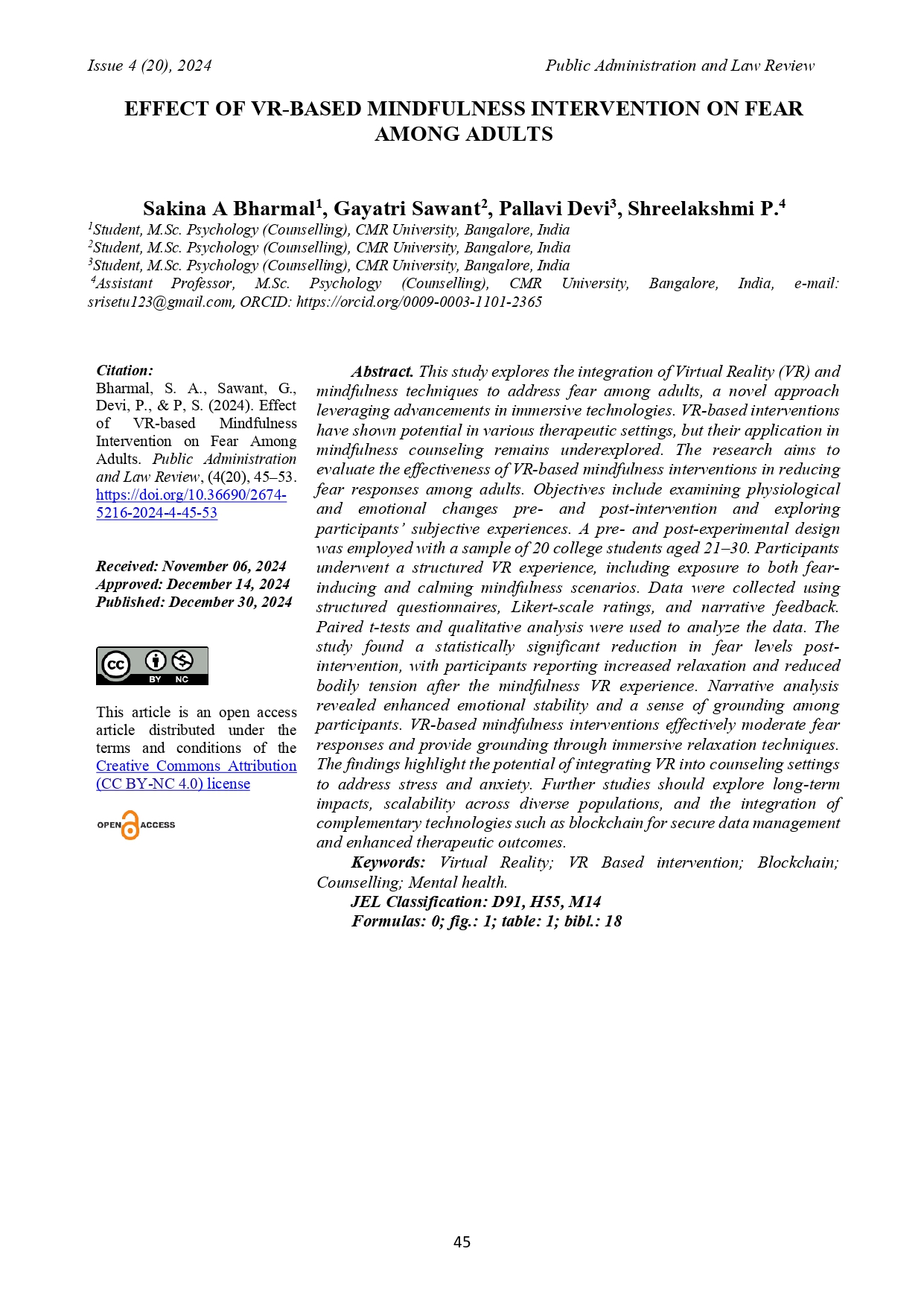EFFECT OF VR-BASED MINDFULNESS INTERVENTION ON FEAR AMONG ADULTS
DOI:
https://doi.org/10.36690/2674-5216-2024-4-45-53Keywords:
Virtual Reality, VR Based intervention, Blockchain, Counselling, Mental healthAbstract
This study explores the integration of Virtual Reality (VR) and mindfulness techniques to address fear among adults, a novel approach leveraging advancements in immersive technologies. VR-based interventions have shown potential in various therapeutic settings, but their application in mindfulness counseling remains underexplored. The research aims to evaluate the effectiveness of VR-based mindfulness interventions in reducing fear responses among adults. Objectives include examining physiological and emotional changes pre- and post-intervention and exploring participants’ subjective experiences. A pre- and post-experimental design was employed with a sample of 20 college students aged 21–30. Participants underwent a structured VR experience, including exposure to both fear-inducing and calming mindfulness scenarios. Data were collected using structured questionnaires, Likert-scale ratings, and narrative feedback. Paired t-tests and qualitative analysis were used to analyze the data. The study found a statistically significant reduction in fear levels post-intervention, with participants reporting increased relaxation and reduced bodily tension after the mindfulness VR experience. Narrative analysis revealed enhanced emotional stability and a sense of grounding among participants. VR-based mindfulness interventions effectively moderate fear responses and provide grounding through immersive relaxation techniques. The findings highlight the potential of integrating VR into counseling settings to address stress and anxiety. Further studies should explore long-term impacts, scalability across diverse populations, and the integration of complementary technologies such as blockchain for secure data management and enhanced therapeutic outcomes.
Downloads
References
Andrea Gaggioli. (2001). Using Virtual Reality in Experimental Psychology. https://www.researchgate.net/publication/255172071_Using_Virtual_Reality_in_Experimental_Psychology
Andros, S., Akimov, O., Akimova, L., Chang, S., & Gupta, S. K. (2021). Scenario analysis of the expected integral economic effect from an innovative project. Marketing i menedžment innovacij, (3), 237-251. https://doi.org/10.21272/mmi.2021.3-20
Barbara Olasov Rothbaum, Larry Hodges, Renato Alarcon, David Ready, Fran Shahar, Ken Graap, Jarrel Pair, Philip Hebert, Dave Gotz, Brian Wills, David Baltzell. (2005). Virtual reality exposure therapy for PTSD Vietnam veterans: A case study. https://onlinelibrary.wiley.com/doi/abs/10.1023/A:1024772308758
Davit Marikyan. (2022). Blockchain adoption: A study of cognitive factors underpinning decision making. https://www.sciencedirect.com/science/article/pii/S0747563222000292
E Swaran, V. S. B., VEEzhinathan, M., Balasubramanian, G., & Taneja, A. (2018). Virtual Reality Therapy for Mental Stress Reduction. Journal of Clinical & Diagnostic Research, 12(10). https// 10.7860/JCDR/2018/36055.12109
Gao D, Su Y, Zhang X, Li H and Luo H (2024) The application of virtual reality meditation and mind–body exercises among older adults. Front. Psychol. 15:1303880. doi:10.3389/fpsyg.2024.1303880
Giuseppe Riva. (2022). Virtual Reality in Clinical Psychology. https://www.ncbi.nlm.nih.gov/pmc/articles/PMC7500920/
Justinia T. (2019). Blockchain Technologies: Opportunities for Solving Real-World Problems in Healthcare and Biomedical Sciences. Acta informatica medica : AIM : journal of the Society for Medical Informatics of Bosnia & Herzegovina : casopis Drustva za medicinsku informatiku BiH, 27(4), 284–291. https://doi.org/10.5455/aim.2019.27.284-291
Lowood, H. E. (2024, October 9). virtual reality. Encyclopedia Britannica. https://www.britannica.com/technology/virtual-reality
Maples-Keller, J. L., Bunnell, B. E., Kim, S. J., & Rothbaum, B. O. (2017). The Use of Virtual Reality Technology in the Treatment of Anxiety and Other Psychiatric Disorders. Harvard review of psychiatry, 25(3), 103–113. https://doi.org/10.1097/HRP.0000000000000138
Mi Jin Park. (2019). A Literature Overview of Virtual Reality (VR) in Treatment of Psychiatric Disorders: Recent Advances and Limitations. https://www.frontiersin.org/journals/psychiatry/articles/10.3389/fpsyt.2019.00505/full
Musamih, A., Salah, K., Jayaraman, R., Seghier, M., Hamdan, H., Ellaham, S., & Omar, M. (2024). Enhancing claustrophobia exposure therapy: A blockchain and NFT-enabled metaverse approach. Computers in Human Behavior, 160, 108364. https://doi.org/10.1016/j.chb.2024.108364
Navarro-Haro, M. V., Modrego-Alarcón, M., Hoffman, H. G., López-Montoyo, A., Navarro-Gil, M., Montero-Marin, J., ... & García-Campayo, J. (2019). Evaluation of a mindfulness-based intervention with and without virtual reality dialectical behavior therapy® mindfulness skills training for the treatment of generalized anxiety disorder in primary care: a pilot study. Frontiers in psychology, 10, 55. https://doi.org/10.3389/fpsyg.2019.00055
Nehal, Ettaloui., Sara, Arezki., Taoufiq, Gadi. (2023). A Blockchain-based Electronic Mental Health Records Model. 320-325. https//10.1109/ICITACEE58587.2023.10277507
Sahoo.S., De.S. (2023). BLOCK-CHAIN TECHNOLOGY TO BUILD PSYCHOLOGICAL BLOCK-CHAIN: A SUBJECTIVE ANALYSIS FOR SALES STRATEGIES. 18. 2620-2634. 10.17605/OSF.IO/FZW2Y.
Seva Rangnekar, Omkar Harishchandra Dalvi, C. A. R. R. V. S. (2023). Blockchain in Psychological Health: The Future of Medical Records. Journal for ReAttach Therapy and Developmental Diversities, 6(1s), 93–104. https://doi.org/10.52783/jrtdd.v6i1s.231
von Ebers, M., Nirjhar, E. H., Behzadan, A. H., & Chaspari, T. (2020, October). Predicting the effectiveness of systematic desensitization through virtual reality for mitigating public speaking anxiety. In Proceedings of the 2020 International Conference on Multimodal Interaction (pp. 670-674). https://doi.org/10.1145/3382507.341888
Zheng, L., Li, W., Song, S. et al. (2024). Effectiveness of Mindfulness-Based Virtual Reality Training on Stress, Anxiety, and Depression among Chinese University Students. Mindfulness 15, 899–913 (2024). https://doi.org/10.1007/s12671-024-02335-4.

Downloads
Published
How to Cite
Issue
Section
License

This work is licensed under a Creative Commons Attribution-NoDerivatives 4.0 International License.





